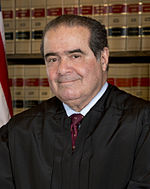Antonin Scalia, Date of Birth, Place of Birth, Date of Death
TweetAntonin Scalia
former Associate Justice of the Supreme Court of the United States
 Date of Birth: 11-Mar-1936
Date of Birth: 11-Mar-1936
 Place of Birth: Trenton, New Jersey, United States
Place of Birth: Trenton, New Jersey, United States
Date of Death: 13-Feb-2016
Profession: judge, lawyer, professor
Nationality: United States
Zodiac Sign: Pisces 
About Antonin Scalia
- Antonin Gregory Scalia ( (listen) March 11, 1936 – February 13, 2016) was an American lawyer, jurist, government official, and academic who served as an Associate Justice of the Supreme Court of the United States from 1986 until his death in 2016.
- He was described as the intellectual anchor for the originalist and textualist position in the Court's conservative wing.
- For catalyzing an originalist and textualist movement in American law, he has been described as one of the most influential jurists of the twentieth century.
- Scalia was posthumously awarded the Presidential Medal of Freedom in 2018. Scalia was born in Trenton, New Jersey.
- A devout Catholic, he received his undergraduate degree from Georgetown University.
- He then obtained his law degree from Harvard Law School and spent six years in a Cleveland law firm before becoming a law professor at the University of Virginia.
- In the early 1970s, he served in the Nixon and Ford administrations, eventually becoming an Assistant Attorney General.
- He spent most of the Carter years teaching at the University of Chicago, where he became one of the first faculty advisers of the fledgling Federalist Society.
- In 1982, President Ronald Reagan appointed Scalia as a judge of the U.S.
- Court of Appeals for the District of Columbia Circuit. In 1986, he was appointed to the Supreme Court by Reagan and was unanimously confirmed by the Senate, becoming the Court's first Italian-American justice. Scalia espoused a conservative jurisprudence and ideology, advocating textualism in statutory interpretation and originalism in constitutional interpretation.
- He peppered his colleagues with "Ninograms" (memos named for his nickname, "Nino") which sought to persuade them to agree with his point of view.
- He was a strong defender of the powers of the executive branch.
- He believed that the Constitution permitted the death penalty and did not guarantee the right to abortion or same-sex marriage.
- Furthermore, Scalia viewed affirmative action and other policies that afforded special protected status to minority groups as unconstitutional.
- These positions earned him a reputation as one of the most conservative justices on the Court.
- He filed separate opinions in many cases, often castigating the Court's majority using scathing language.
- Scalia's most significant opinions include his lone dissent in Morrison v.
- Olson (arguing against the constitutionality of an Independent-Counsel law), his majority opinion in Crawford v.
- Washington (defining a criminal defendant's confrontation right under the 6th Amendment), and his majority opinion in District of Columbia v.
- Heller (holding that the 2nd Amendment to the U.S.
- Constitution guarantees a right to individual handgun ownership).
Read more at Wikipedia
See Also
- Famous People's Birthdays on 11 March, United States
- Famous People's Birthdays in March, United States
- Famous judge's Birthdays on 11 March, United States
- Famous judge's Birthdays in March, United States
- Famous lawyer's Birthdays on 11 March, United States
- Famous lawyer's Birthdays in March, United States
- Famous professor's Birthdays on 11 March, United States
- Famous professor's Birthdays in March, United States

